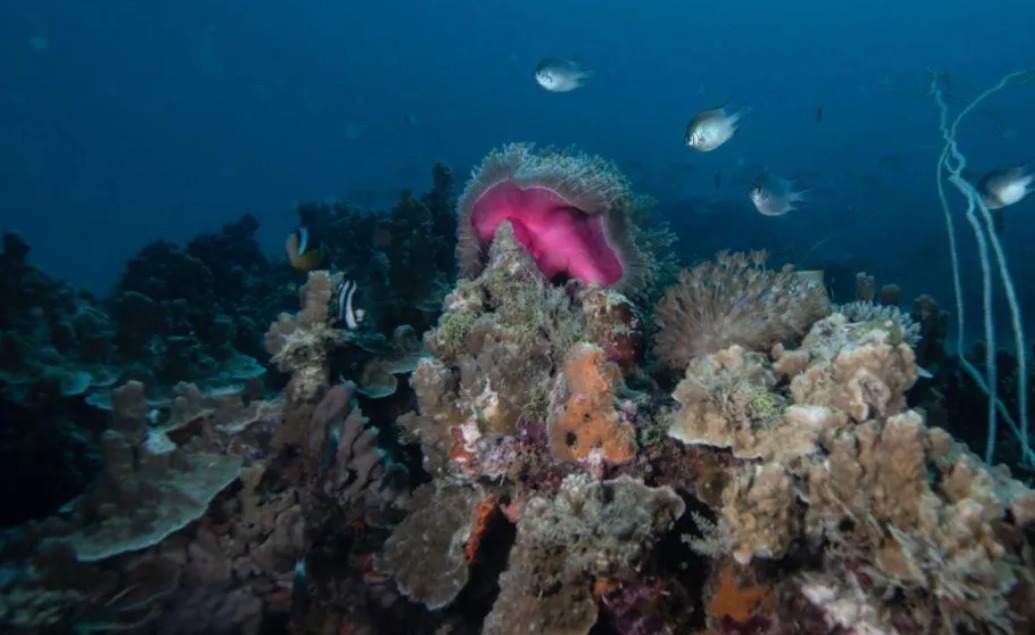Looking out over the Indian Ocean from Mnemba Island today, it’s hard to believe that just three years ago, the stunning coral reef surrounding this part of the Tanzanian archipelago of Zanzibar was dying.
Threatened by climate change, overfishing, and other human activities, the islanders risk losing their livelihoods and being forced to relocate.
Concerned about saving the oval-shaped, colorful reef, close to the shore and about 7 km long, the island’s communities embraced a conservation project that has successfully restored some of what was lost.
The initiative also aims to protect the reef through other means, globally renowned for its beauty.
The water is so clear that the reef, which lies 10 meters below the surface, seems almost within reach.
But a few years ago, locals began to notice how stressed the corals were, partly due to climate change, which led to warmer sea temperatures.
Coral looks like a plant, but it’s actually a type of animal: several small creatures called polyps. They grow very slowly and form a hard outer shell by extracting salt from seawater, then merge to form what are called colonies.
Reefs are sometimes called the « rainforests of the sea » because they create ecosystems that harbor a wide diversity of marine life.
But when the water warms a few degrees above normal, the coral expels the colorful algae living inside it, which provide nutrients. When the algae disappear, the coral bleaches, turns white, and eventually dies.
Dynamite used by fishermen also killed coral, as did many unregulated tourist boats and divers, causing damage to the reef.
Juma Mshindan, a fisherman from Mnemba Island, says it became clear that something was seriously wrong: « There’s a significant difference in fish availability now compared to before. Once, fish were abundant. »
Oceans Without Borders Aerial view of MnembaOceans without borders
The coral reef is easily visible through the clear water around the island Sustainable tourism group &Beyond and nonprofit Africa Foundation began collaborating with islanders in September 2021 to help address some of these issues.
Underwater nurseries have been created using steel lattice tables, where coral fragments are grown to be replanted on the coral reef.
They are nurtured and cared for by locally trained divers acting as forest rangers.
It takes about two to three months for a colony of coral to form, after which rangers take them to the reef.
Results so far have been promising, with restored coverage up to 80% on what’s called the « home reef » surrounding the island.
« It’s like they’ve grown on their own, » says forest ranger Hija Uledi.
« We’ve restored the reef and you can’t tell the difference. Now, there’s fish around. The work is great, and many species can be seen. »
Ecologists have also created artificial reefs—steel and stone structures placed about 3 km offshore from the island—where ecologists also plant newly cultivated coral from the nurseries.
These sites are intended to contribute to rebuilding marine life, benefiting fishermen. They have also become destinations for snorkelers and divers.
Dr. Camilla Floros, lead scientist of the Oceans Without Borders program at the Africa Foundation, says the ongoing restoration program ensures they work with the right materials, learning from past mistakes worldwide.
« When artificial reefs were in their infancy, people used the wrong materials, like tires, to try to create them, which is not the right approach, » she says.
The success of regeneration work around Mnemba Island is credited to local community support, acknowledges Dr. Floros.
« Whenever we have a new initiative, we discuss it with them and get their buy-in, » she says.
Atuwa Omar is a local resident who got involved in restoration. Before taking a job as a forest ranger, the 24-year-old woman was at home taking care of her young child.
« Being a ranger in this project on Mnemba Island allows me not only to feed my family but also to support my son’s education, » she says.
Even though Ms. Omar admits it hasn’t been easy for her as the only woman working on the project.
She faced conservative attitudes from some who didn’t want women involved—but she feels the challenges were worth it.
Conservation groups have worked closely with local authorities, and the seas around Mnemba have been designated a protected area by the Zanzibar government, a semi-autonomous part of Tanzania, in 2022.
This means measures can now be taken to limit damage from tourists and fishermen.
Bakari Jaha, coordinator of the Africa Foundation in Zanzibar, highlights the importance of tourist traffic that once visited the reef.
« At first, the area faced significant tourist pressure, with 200 boats carrying at least 400 guests entering an area of just 200 square meters, » he says.
« To preserve the area, the government, in collaboration with &Beyond and Africa Foundation, decided to limit the number of visitors to 80. »
Previously, visitors were charged $3 (£2.40)—this cost has now been increased to $25.
« This approach has not only improved environmental preservation but also increased revenue, » says Mr. Jaha.
Fishing has also been suspended around the ongoing home reef restoration.
« We’ve seen positive changes. Illegal practices, like dynamite use, have decreased, and fishermen are more informed about sustainable fishing methods, » explains Mshenga Ally, a fisherman.
Traditional dhow boats sail off Mnemba Reef in the azure sea on December 12, 2008 in Zanzibar, Tanzania.
It’s easy to understand why the island and the waters around it attract tourists The Zanzibar government is so encouraged by the success of the Mnemba restoration project that it’s looking to expand it to other threatened areas.
« The government has identified 14 areas with intact reefs and others with damaged corals, and we plan to preserve them, » says Dr. Makame Omar Makame, director of Zanzibar’s marine department.
« We’ve placed buoys so people are cautious and understand fishing activities aren’t allowed here. »
The pressures on Zanzibar’s reefs reflect threats faced by coral reefs worldwide. Those involved in the Mnemba project say while they can’t stop warmer ocean currents, they hope their efforts can help other threatened areas.
« The relationship between the sea and coral is essential to ocean health. We’ve seen regeneration of corals, even at significant depths, » says Mr. Jaha.
« We let sea conditions restore reefs to their original state. »3.5




